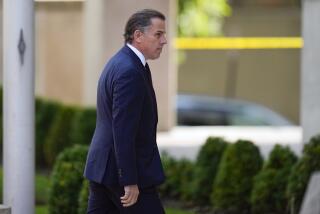Silence in the Chicago Probe Baffles Traders
CHICAGO — A baffling silence has settled over the Justice Department’s elaborate undercover investigation of alleged widespread fraud in the trading pits of the world’s two largest commodities exchanges, the Chicago Board of Trade and the Chicago Mercantile Exchange.
The appearance of inactivity by investigators and the grand jury has traders and brokers subpoenaed in the investigation, as well as their lawyers, uneasy and uncertain.
The silence and lack of activity follows the flurry of publicity triggered by disclosures in January that at least four undercover FBI agents worked for 18 months in the trading pits of the two exchanges collecting evidence of allegedly illegal transactions.
The undercover phase was part of an elaborate three-year probe of the two exchanges, where futures contracts on a range of commodities from wheat to silver and from hogs to U.S. Treasury bonds are traded. The investigation here apparently is not related to Thursday’s raid by federal agents on futures exchanges in New York.
“This is the lull before the storm,” said one criminal defense lawyer who represents several Chicago exchange members under investigation and who, like many other lawyers, spoke on the condition that he not be identified by name. “I expect indictments before the end of the month.”
However, no witnesses have been called before the grand jury’s Wednesday sessions for several weeks, according to defense lawyers. The Justice Department veteran heading the probe is now involved in a major political corruption trial and reportedly has not been active in the commodities investigation for several weeks. Lawyers have had little or no contact with prosecutors who, earlier, were frequent callers soliciting the cooperation of their clients.
Flooded With Documents
The only significant activity in recent weeks has been a continuing effort by government investigators to subpoena records. So far, thousands of pages have been gathered.
“They are mired in an investigation of routine trade practices,” said John Troelstrup, a commodities lawyer and former chief “policeman” at the Chicago Mercantile Exchange. “I think they are inundated with documents and faced with a lack of anticipated cooperation--and they’ve got a tough row to hoe.”
“It has been completely quiet for more than a month,” said another criminal defense lawyer and former federal prosecutor. “No one has any idea what’s going on.”
Defense lawyers interviewed for this article cited a variety of theories concerning the investigation.
Among them is a belief that the government was slowed when so few traders and brokers agreed to cooperate with the investigation even after being threatened with confiscation of their property under federal racketeering laws. Those threats came during late night and early morning visits by teams of FBI agents and Justice Department lawyers.
Many of those subpoenaed earlier refused to testify, citing Fifth Amendment guarantees against self-incrimination or the Fourth Amendment protection against illegal government surveillance, in this case allegedly improper electronic surveillance.
Lawyers representing potential defendants in the long investigation believe that only a handful of exchange traders and brokers are cooperating with government investigators.
Some lawyers believe that the government has been overwhelmed with the number of documents to be reviewed.
More to Read
Sign up for Essential California
The most important California stories and recommendations in your inbox every morning.
You may occasionally receive promotional content from the Los Angeles Times.










